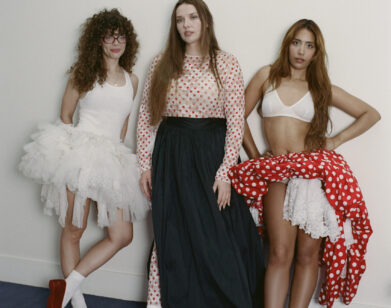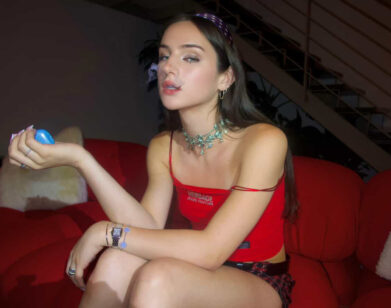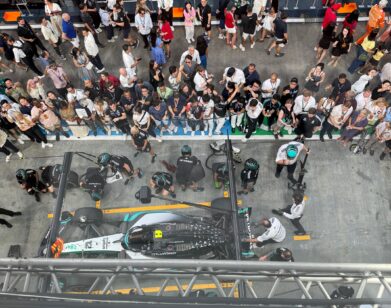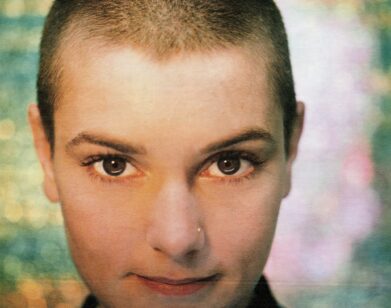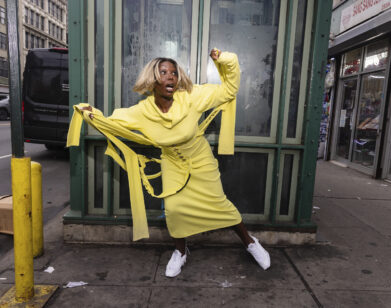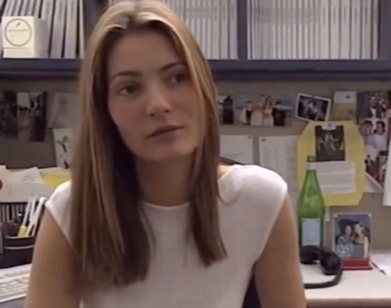ACTIVISM
Gagging for Gays Against Guns
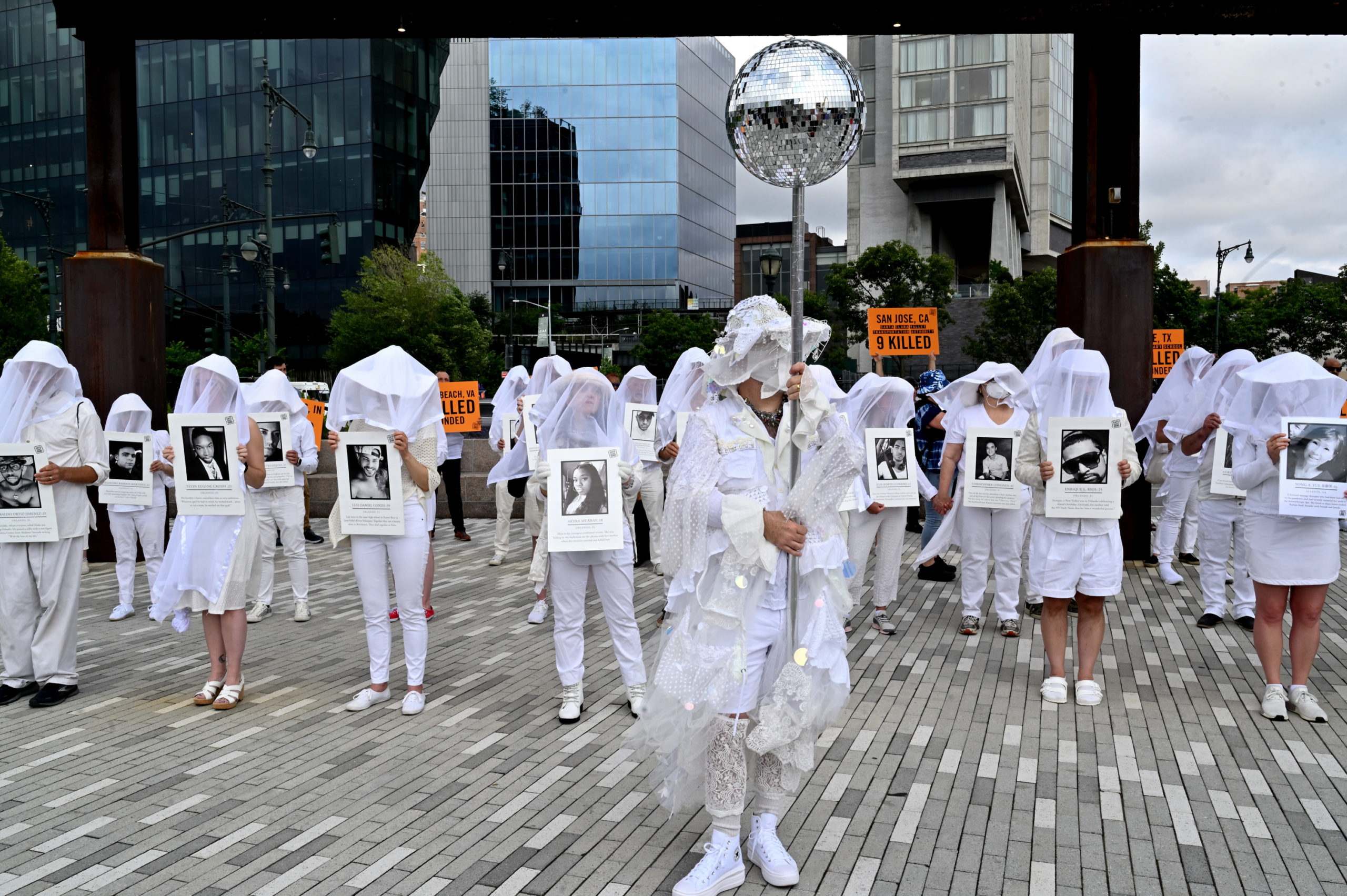
The disco ball is back—only this time, it’s being wielded for political means. In the protests organized by New York-based direct-action group Gays Against Guns (GAG), the mirrored orb is brandished in a sea of white-veiled “Human Beings” who represent victims of gun violence. For GAG, it’s an homage to the 49 LGBTQ+ and majority Latinx victims of the 2016 Pulse nightclub shooting in Orlando. The group, formed after the tragedy in response to the country’s gun violence epidemic, uses these political actions to advocate for a broader understanding of “the gun industry’s chain of death” by outing the investors, manufacturers, and politicians who block safer gun laws. This fight against the opacity of the American political machine is echoed by Weekly Senator. Founded by Michael Bullock, a writer, editor, and member of the political action committee Downtown for Democracy, the platform educates voters on senate races and streamlines weekly donations to progressive candidates across the nation. Last week, Bullock called up Brigid McGinn, one of GAG’s key members, to discuss activism, gun shows, and the future of political funding.—ELLA MARTIN-GACHOT
———
MICHAEL BULLOCK: Alright, so you had an event [in Manhattan] this weekend. Do you describe them as happenings or protests?
BRIGID MCGINN: Well, we have actions and we have vigils and we have rallies. We have Human Beings who dress all in white and wear veils over their faces in order to become as invisible and silent as possible. They hold a placard with a name and the story of people who died in mass shootings. Of course, there are many shootings where a lot of people are injured and don’t die. Because of that, this year we decided to represent every mass shooting since [the date of the Pulse nightclub shooting] June 12th, 2016. We had 98 volunteers all dressed in white. It makes me teary even now, because they represented the people from Parkland, the people from Boulder, from the schools. We stood outside of Little Island in silence, then we decided to go up onto the island. As we walked up the ramp, we were stopped, and the manager of the park said, “You can’t come in.” We decided to become activists at that moment. Kevin [Hertzog, co-founder of GAG] and I were like, “Let’s just start walking.” And so we made Little Island a little uncomfortable. Which is important, because that’s how people start to pay attention.
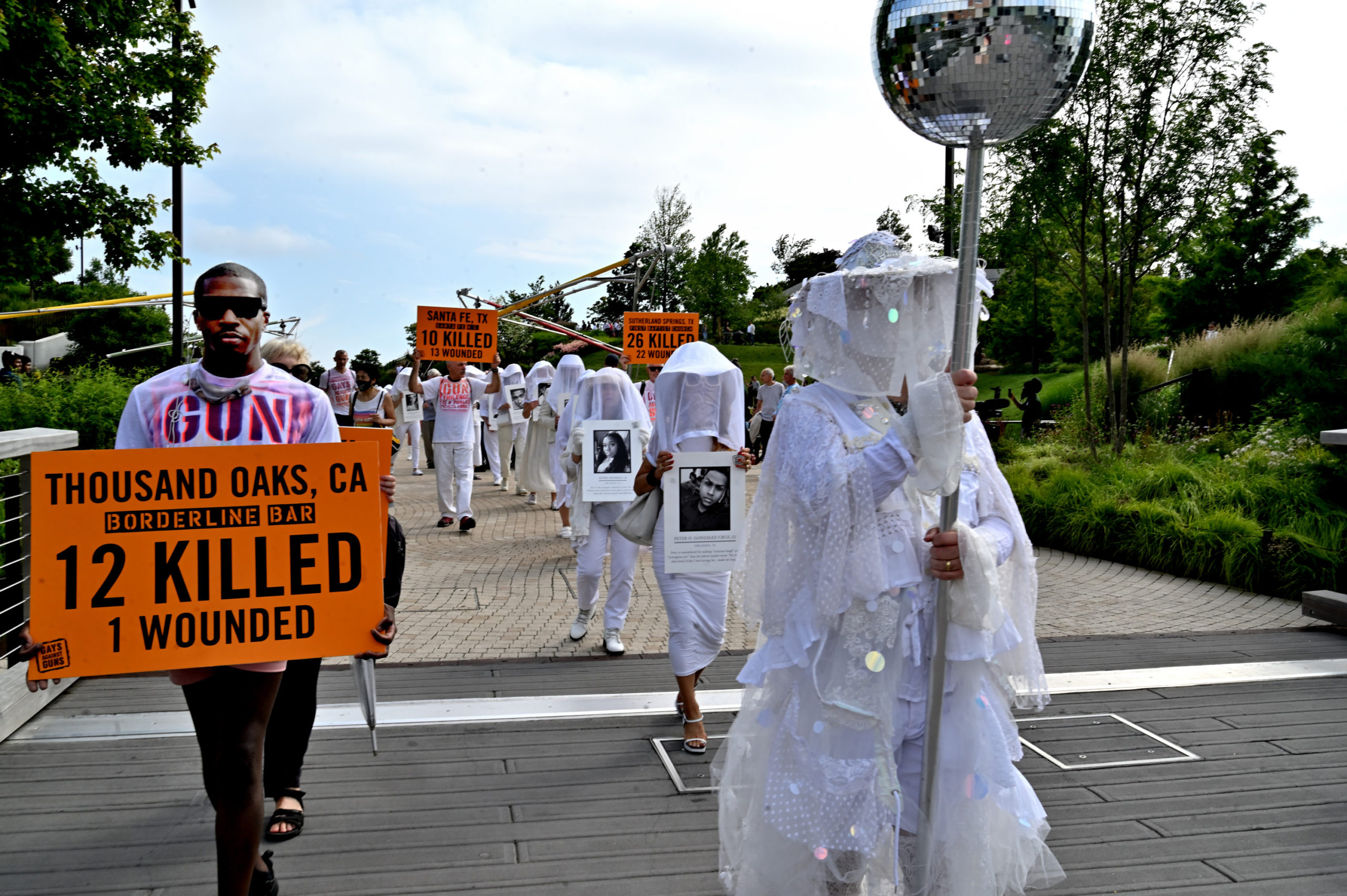
BULLOCK: So it’s using spectacle and art to get an emotional response from people.
MCGINN: Correct. And to get them to join us. Because if you’re singing, people sing along. If you’re dancing, people dance along.
BULLOCK: What do you sing?
MCGINN: We had a singing group that began in Gays Against Guns, which we called “Gag Reflex.” Then our songwriter decided once the [2016] election happened that he wanted to write more songs about more political issues, so Sing out, Louise was born. It’s run by Mark Leydorf, who rewrites lyrics to Americana songs. We sing “God help America, what have you done?” And we sing Christmas songs like, “Donnie, the conman was a very nasty soul.” When we’re out singing, people stop and sing along. Sometimes they realize what they’re singing, and they walk off in a huff. And sometimes they’re like, “This is fantastic.”
BULLOCK: Yeah, it’s not about finger-wagging. It’s using the laws of attraction through art and spectacle. So are your actions or vigils mostly in New York?
MCGINN: No, we try to go everywhere. Every Valentine’s Day we go to DC to the Hart building [Hart Senate Office Building] and have an action. We go to the offices of everyone who takes money from the NRA. We give them Bloody Valentine’s and we sing them “My Bloody Valentine.”
BULLOCK: Like a bloody Valentine’s Day card?
MCGINN: Yeah, we have a big card that has the amount of money that they take from the NRA on it. We name, blame, and shame the politicians who take that out. Parkland happened on Valentine’s Day in 2018, and we were in the offices of the Hart building at that moment. I went with another member, Hal Moskowitz, down to Parkland on the day that they were returning to school. We were able to meet people like X González and their parents. GAG has always been very supportive of young people to say, “Express yourself in your own way, in your own terms. It’s your experience.” And they, of course, have been amazing.
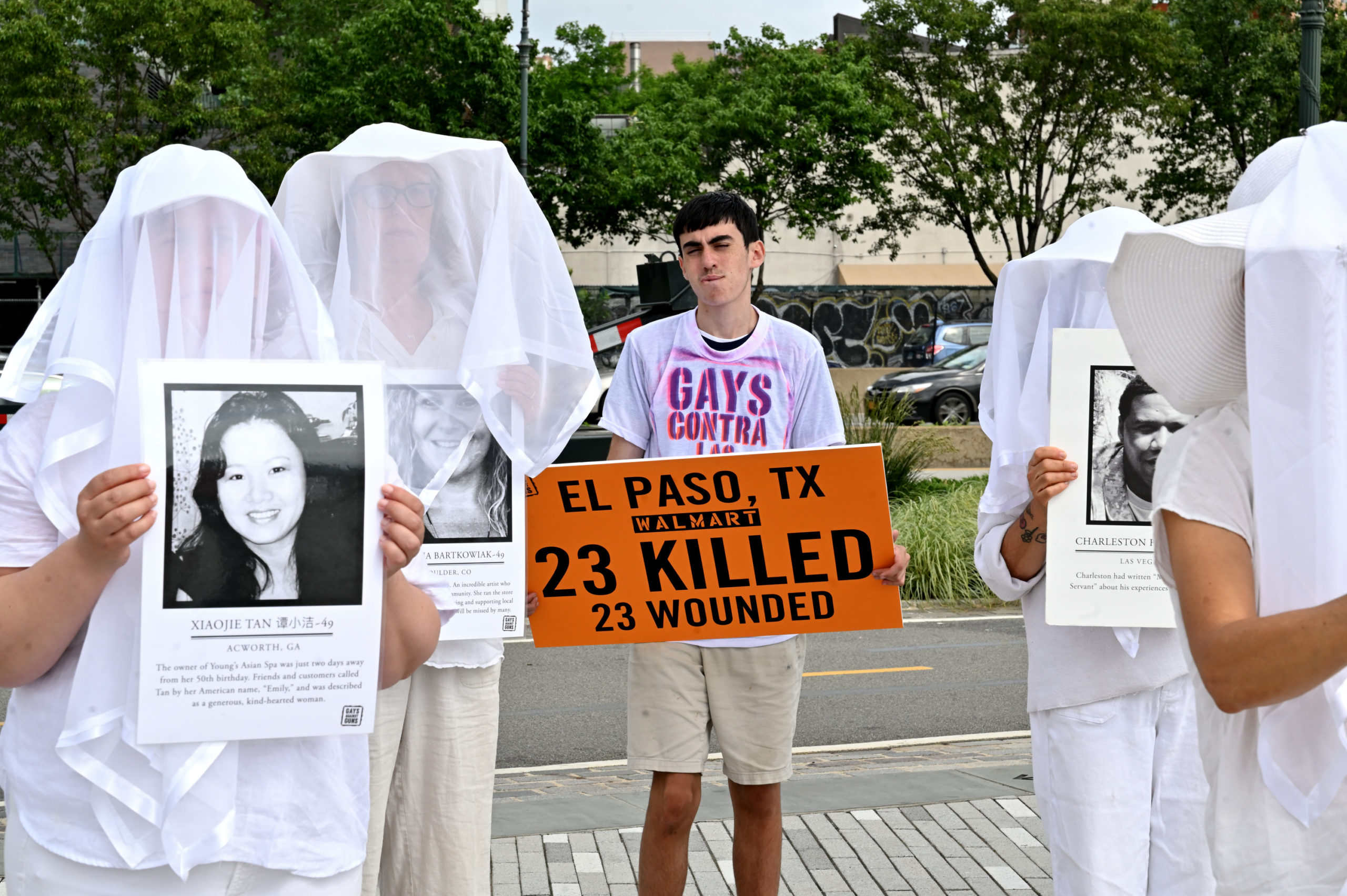
BULLOCK: It goes back to the origins of the gay liberation movement, when they wanted gays to look professional and just like their straight counterparts. That was the way that they thought they would get respectability. It seems wild today when we accept so many different forms of expression, that when it comes to this type of activism, you would still have to maintain a certain decorum.
MCGINN: Yes, like we couldn’t walk into a public park the other day because it would make people “uncomfortable.” And yet people see this violence all the time. I think one of the important things is how inclusive the youth movements have been, because they recognize that it’s more than mass shootings. Kids are getting killed on the streets in our city every day, just because of their easy access to guns. We also go to gun shows, just like the religious right goes to abortion clinics.
BULLOCK: That’s brave. Is that dangerous?
MCGINN: No. We were really scared in the beginning. We went to one, and I’d never been to a gun show, so I really wanted to go inside. I registered and went in. I was filming with my phone in my pocket, just asking people questions. I was like, “My 17-year-old wants a gun, and I don’t feel comfortable.” This guy was telling me what kind of AR-15 would be most appropriate for my [teenager], and how he could get it in New York. In the middle of it, somebody whispered in his ear, and he went, “Yes! The gays are here, gotta go.” I’m like, “Oh, shit, what’s gonna happen now?” So I followed them, but they didn’t even go outside. They just stood inside at the windows and were like, “Oh, there they are. Oh, oh.” There was no confrontation whatsoever.
Of course, there were other people who came up and spoke to us, because they saw the Human Beings holding images of the people who died in their community by gun. They say, “Oh, my daughter went to school with that woman,” or, “I remember that, that was in my neighborhood,” or, “Why are you so against guns?” And we say, “We’re really just for laws so that people can be protected. Do you lock your gun? How many guns do you have? Why do you need that many guns?” That sort of thing, just to have a conversation.
BULLOCK: I just watched the clip last night of a reporter asking a congressman, “So why did you not raise the age limit on gun ownership?” And he was like, “Well, that would just take away the rights of people for those two years.” And I was like, “But they can’t drink in those two years. What about those rights?” Those rights are fine to take away, but these rights that are more dangerous aren’t.
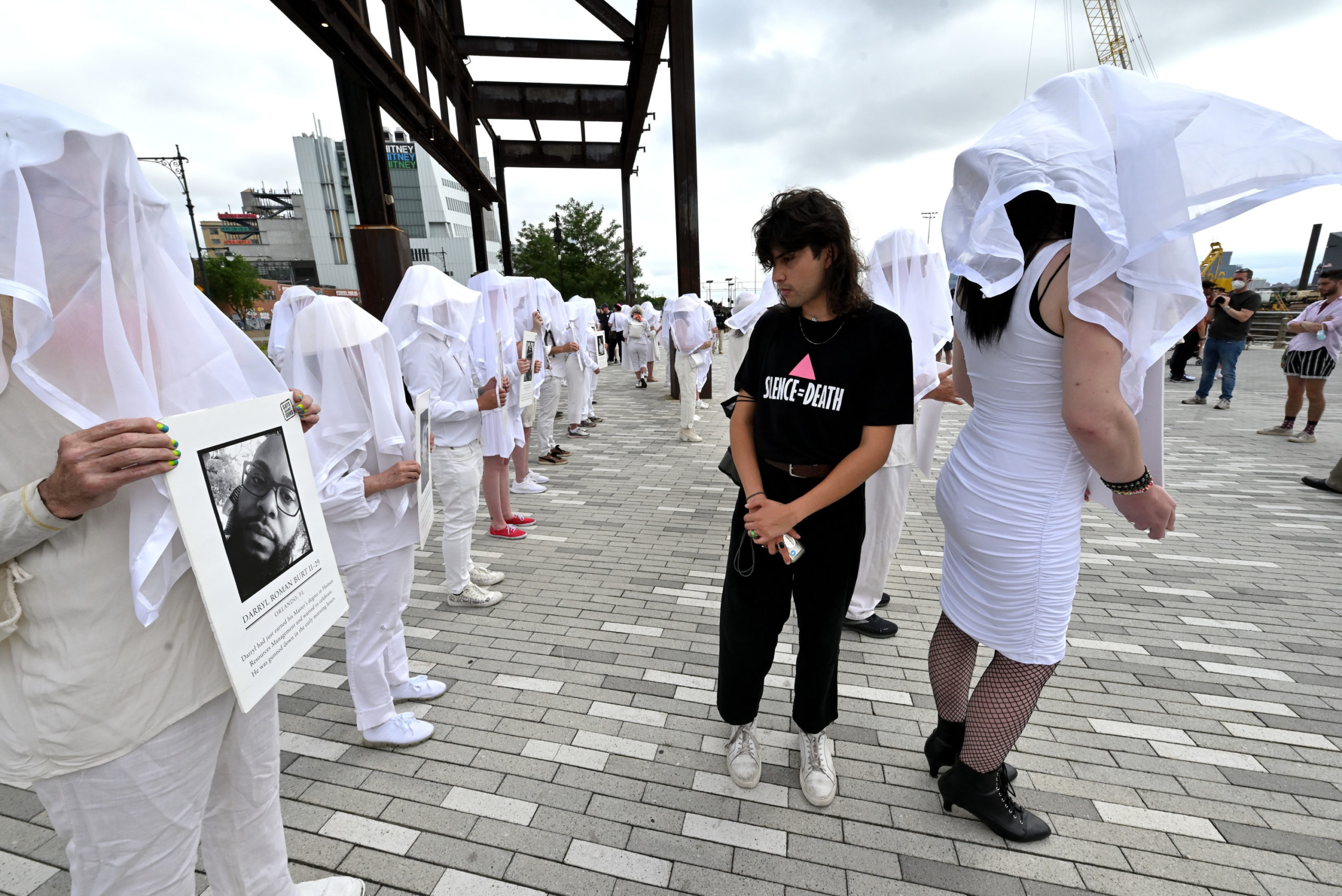
MCGINN: And of course it’s the politicians and our representatives who have the NRA in their pocket. I heard two of them last week on the news stating that AR-15s were necessary because farmers need to protect their chickens from the foxes that eat crops. And they were serious. Part of this is just making people aware of how crazy that is.
BULLOCK: It’s super important. I’m really grateful for the work that you’re doing, and I think that that’s a good segue to Weekly Senator because that’s the crux at which these two projects are connected.
MCGINN: Exactly. Because it’s so important for us to know who we’re voting for. So what are you aiming at with Weekly Senator?
BULLOCK: I built Weekly Senator so every person who cares about keeping democratic control and expanding democratic control will know who to support. At the point that people start to know about Senate races, it’s the end of the race. My goal is to identify the candidates who are worthwhile early-on and fund them continuously until the election. It’s like CliffsNotes for the Senate. When you become a weekly donating member you get an email on Monday morning that says, “Mandela Barnes in Wisconsin is a great candidate. If you want to know more about him, click through to the website.” You can see all of his policy positions, who his opponent is, and what the history of the voting in the state is. If, for whatever reason, you don’t want to donate to his campaign, you can opt out and redirect your funds for that week to a nonprofit like Planned Parenthood or Color of Change. Senate races are deliberately hard to understand. I mean, I built this for myself, I wanted to understand where to direct my time and resources. It’s about self-educating as I’m sharing information with thousands and thousands of other people.
MCGINN: I think that’s so cool what you just said about your desire for self-education. People don’t understand that artists are researchers. We create because we’re curious, because we’ve learned things, because we want to understand things.
BULLOCK: Part of art is about understanding and communicating. And I think that those two things are essential in politics. I was developing Weekly Senator when the George Floyd protests were happening, and I just thought if there was a way to link activist identity and electoral politics, then things could really change in this country. I don’t know if Weekly Senator is the tool to bridge that divide. It’s basically for the person that listens to NPR and is a sustaining member of Planned Parenthood and the ACLU. It’s a solution for someone that’s already part of the donor mentality. I would love to figure out ways to tap into the energy of activists and bring them into the fold of electoral politics, because I think that that’s the future of people power.
MCGINN: It is. And I think that you can be that link. It’s especially crucial right now because what’s happening is that the white, corporate, patriarchal system of GOP control over—in our case—gun laws in America has gaslit populations so much. They are provoking the Black activist movement, people of color, Indigenous communities, in order to blame them for the problem. I feel like guns are going to be what brings democracy down in our country.
BULLOCK: I agree. We’ve definitely overrun our time, but I do think that our projects really complement each other.
MCGINN: They do, yeah, and I hope we work together.
BULLOCK: Me too.

